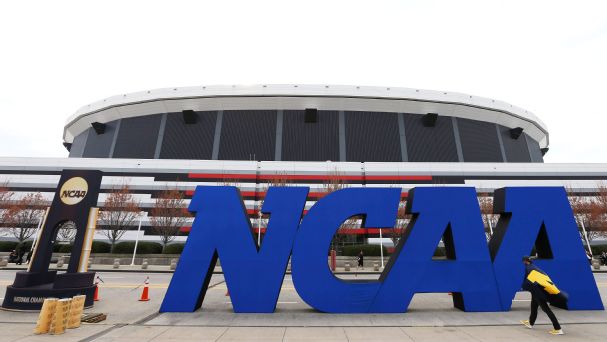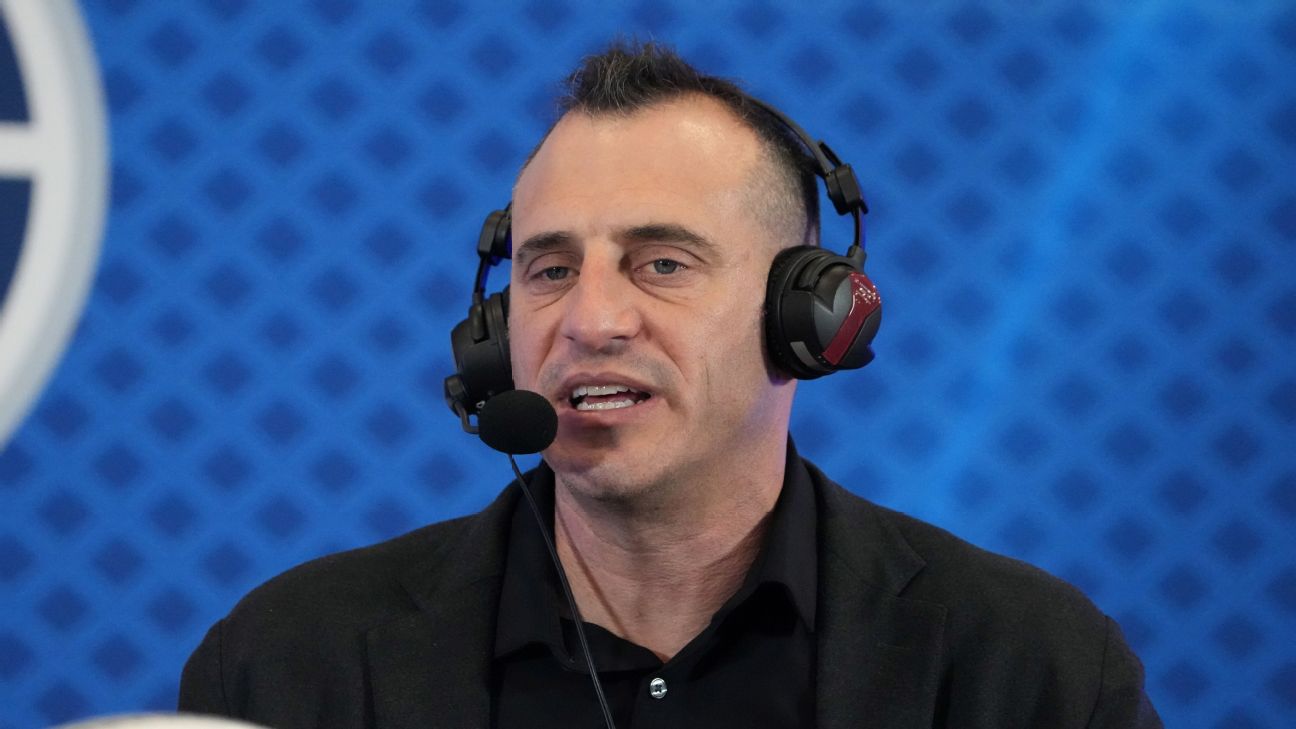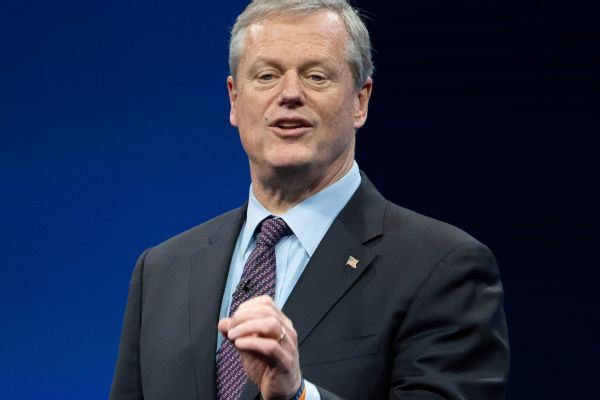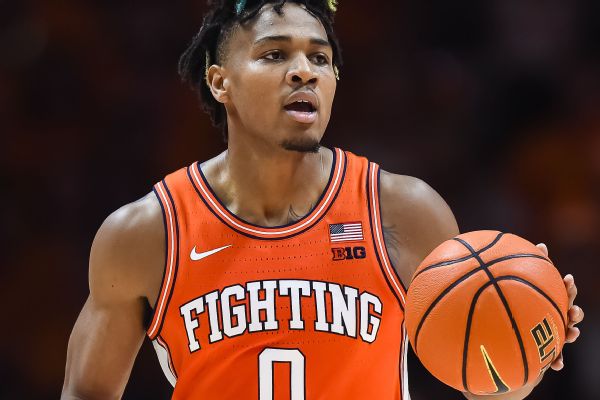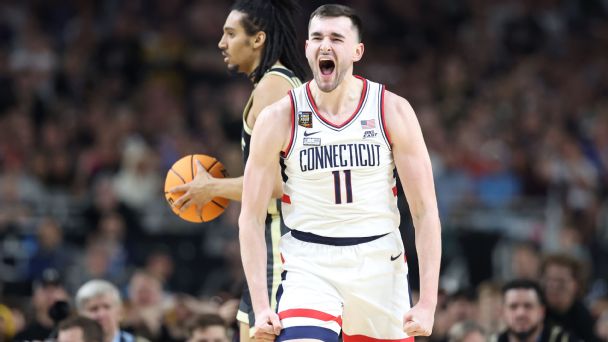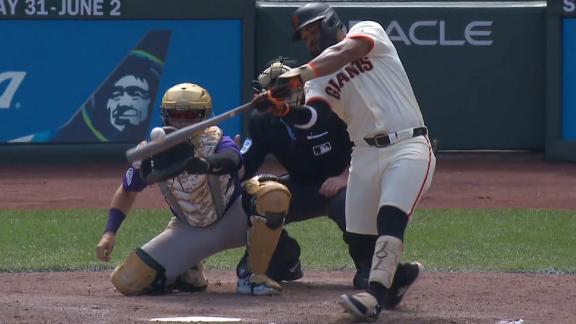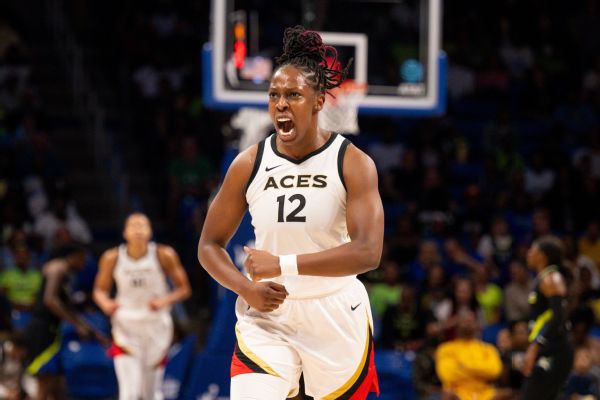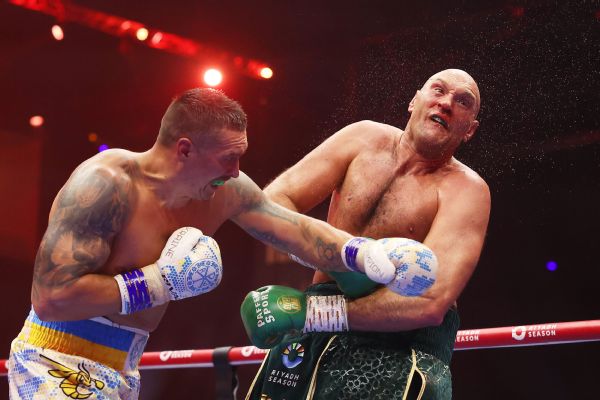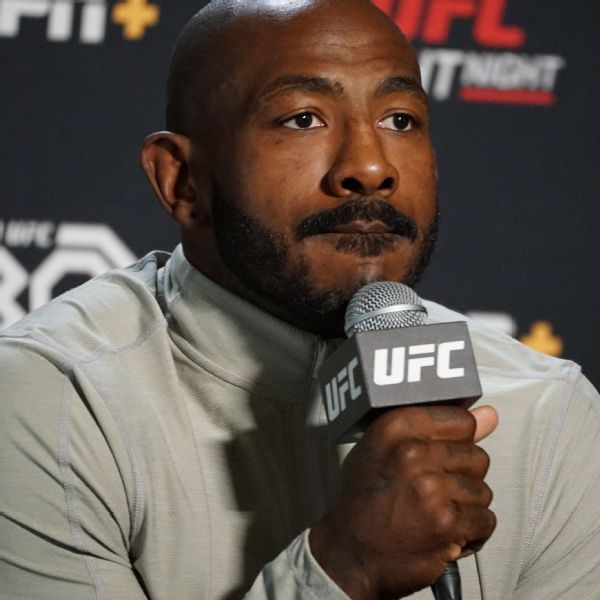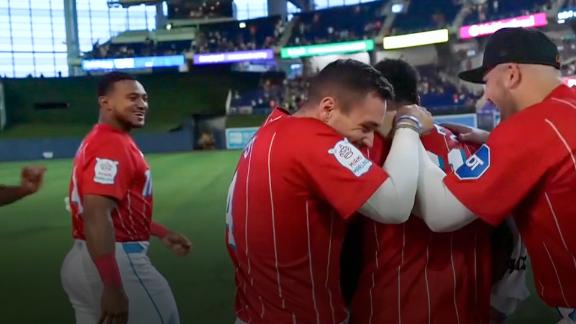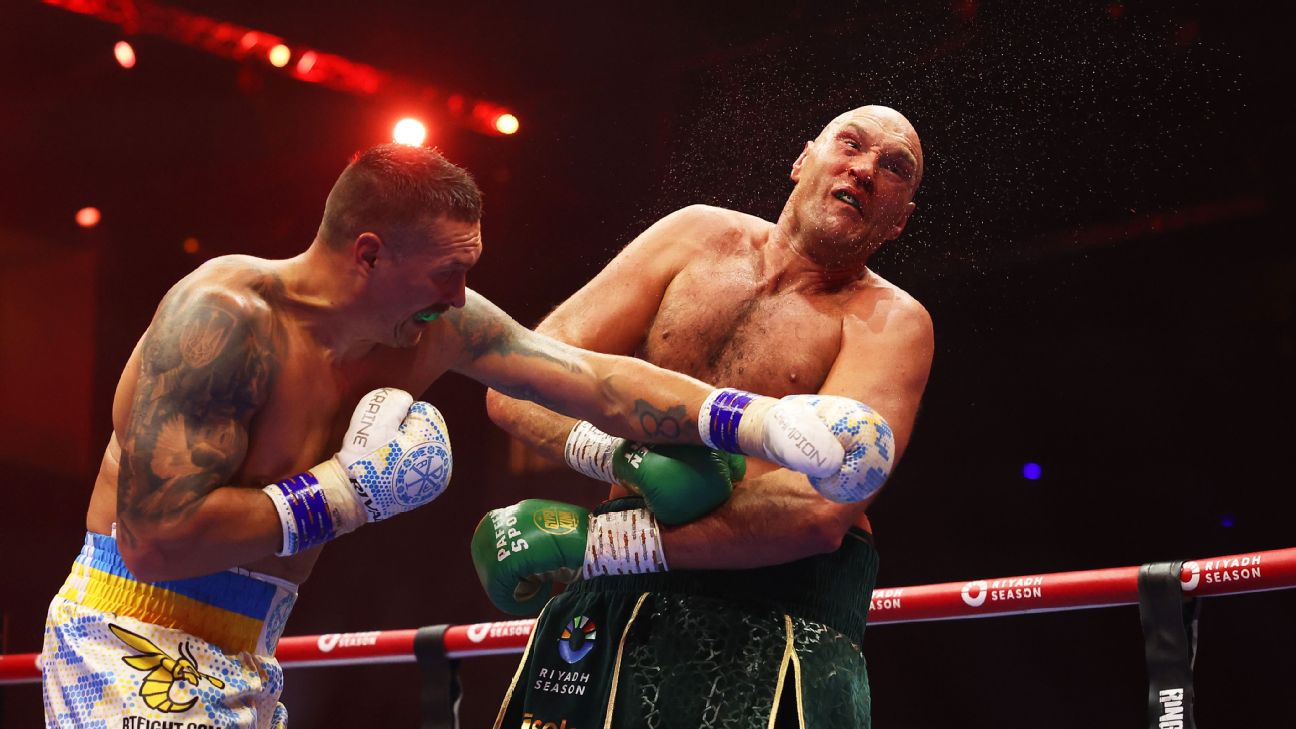![LeBron James Top-20 [608x342]](https://a.espncdn.com/photo/2024/0506/r1329109_608x342_16-9.jpg)
Christopher Morel hits RBI single in the 9th to give Cubs a 1-0 win over Pirates
The opening round of the 2024 NBA playoffs is in the books, and it wasn't without its surprise twists or heroic performances. From Jamal Murray and the defending champion Denver Nuggets closing out the Los Angeles Lakers to Jalen Brunson's old-man shot-making for the New York Knicks, Philadelphia 76ers star Tyrese Maxey's four-point play, and the wild back-and-forth Game 3 battle between the Milwaukee Bucks and Indiana Pacers, this postseason etched some indelible moments into NBA history.
Now it's time to assess who played the best during this initial set of games, and whether the remaining players can maintain their performances in Round 2 and beyond.
To help measure who was most valuable during the first round, we're using a metric I'm calling consensus wins, which averages a player's value across a number of advanced metrics. We'll be combining estimated RAPTOR, box plus/minus (BPM), win shares and player efficiency rating (PER) into a single measure of wins added in which each component gets equal weight.
Despite his Lakers losing, LeBron James was one of the most valuable players of Round 1 because he carried his team offensively -- he had a 63.7% true shooting percentage with a 29.0% usage rate and assisted on 36.4% of teammate baskets when on the court -- while also making an impact on defense with a 3.0% steal rate and 2.1% block rate. Looking at his component wins added via BPM (1.7), PER (1.5), RAPTOR (1.2) and win shares (0.8), our consensus estimates James produced 1.3 wins during the first round, which ranked third highest behind only Denver's Nikola Jokić, Dallas' Kyrie Irving and Philadelphia's Joel Embiid. The Lakers might have been eliminated by Denver, but they likely would have been swept for the second straight postseason without James' play.
(We'll adjust for the length of each series to make sure players on the Oklahoma City Thunder or Minnesota Timberwolves aren't penalized because they closed out their first-round opponents in four-game sweeps.)
This ranking is not the same as the one compiled by my colleague Chris Herring before the playoffs began. He was looking at the entirety of a player's résumé to determine the best players of the postseason field. Here, we're looking at the best players of Round 1. Many stars are on both lists, but some surprising players will appear here because they had stellar performances in the stretch of four to seven games that made up the first round. Still other players didn't crack the top 20 because it is a holistic ranking: Each metric values something different to a greater or lesser degree, so a player has to impress across many dimensions to rate highly here.
With that said, here are the 20 most valuable performers of the first round, by the numbers:
1. Nikola Jokić, C, Denver NuggetsRAPTOR Wins: 1.2 | BPM Wins: 2.2 | Win Shares: 1.3 | PER Wins: 2.1 | Consensus Wins: 1.7 | Per game: 0.340
Ever the advanced-metrics darling, Jokić tracked down OKC's Shai Gilgeous-Alexander and surpassed him for the league lead in most categories by the end of the regular season. He put up mind-boggling numbers in Denver's five-game effort over the Lakers: 28.2 points, 16.2 boards and 9.8 assists per game with a 67.2% true shooting mark. The only blemish on Jokić's record was that -- along with the rest of the Nuggets' starters -- Denver defended much better when he wasn't on the floor, which helped leave the team's average scoring margin lower than we would expect from a 4-1 series.
What's next? One of the most interesting matchups of the playoffs might be Jokić against the Timberwolves' towering frontcourt combo of Rudy Gobert and Karl-Anthony Towns. Versus the Phoenix Suns, that pair combined for more than 34 points and 20 rebounds per game while shooting 56% from the floor, with Gobert making his usual defensive impact. But for his part, Jokić averaged 33.3 points per game (on 64% true shooting) with 11.8 rebounds per game against Minnesota during the regular season, so he has proven he can match their production almost single-handedly. The most telling stat from Game 1 of the series is that Denver was, shockingly, -12 with Jokić on the court, a number worth monitoring closely throughout the second round.
2. Anthony Edwards, SG, Minnesota TimberwolvesRAPTOR Wins: 1.1 | BPM Wins: 1.4 | Win Shares: 0.9 | PER Wins: 1.4 | Consensus Wins: 1.2 | Per game: 0.309
If Edwards hadn't already established his place among the top tier of NBA stars during the regular season, leading a Round 1 sweep truly cemented him as a player who can be the centerpiece of a successful playoff squad. Heading up a Minnesota team that was (laughably, in retrospect) a pre-series underdog versus the Suns, Edwards went for 33 or more points and 9 rebounds in three of the four games while also having a demonstrable effect on his team's bottom line. (The Wolves were 10.2 points per 100 better on D with Ant, a better differential than even Gobert had.)
What's next? The next test of Edwards' championship-leading bona fides comes up immediately in the form of Jokić and the Nuggets. The Wolves' offense, powered primarily by Edwards, was far and away the best in the first round of the playoffs, but that was against Phoenix. Doing the same against Denver might prove more challenging -- though Edwards did score a game-high 43 in Minnesota's Game 1 win on Saturday.
3. LeBron James, PF, Los Angeles LakersRAPTOR Wins: 1.2 | BPM Wins: 1.7 | Win Shares: 0.8 | PER Wins: 1.5 | Consensus Wins: 1.3 | Per game: 0.263
If this was James' final postseason as a Laker, it was a fitting symbol for most of his tenure with the franchise. Individually, James was his usual outstanding self, averaging 27.8 points, 8.8 assists and 6.8 RPG while shooting 57% from the floor and ranking among the leaders in consensus wins. Yet, his Lakers struggled to stay afloat when he wasn't on the court, couldn't hold a lead in the second half and were incapable of getting the stops they needed. In the end, as remarkable as LeBron was, he could only do so much to elevate this supporting cast.
What's next? Look for another summer of intrigue in Lakerland -- James can opt out of his contract in free agency, and the specter of playing with his son Bronny James (who entered the NBA draft pool and will be invited to the summer combine) will hang over all of his potential moves. There's also the question of how much longer LeBron can keep doing this, though the 39-year-old's playoff performance showed no signs of age-related slowdown.
4. Kyrie Irving, SG, Dallas MavericksRAPTOR Wins: 1.6 | BPM Wins: 1.6 | Win Shares: 1.2 | PER Wins: 1.6 | Consensus Wins: 1.5 | Per game: 0.251
It's been a while since we've gotten a chance to really see what Kyrie is capable of on the playoff stage, and he didn't disappoint in Round 1 against the LA Clippers. Playing next to Luka Dončić -- who produced his typically unbelievable numbers, but didn't have the best series shooting the ball -- Irving picked up the slack with averages of 27, 6 and 5 while hitting 45% from deep and posting a 64.7% true shooting percentage. (In addition to 30 in Game 6 to close out the Clippers, he almost single-handedly rallied the Mavs from down 31 with 40 points in Game 4.) This was exactly the type of performance Dallas was looking for when they tabbed Irving as Dončić's running mate before last year's trade deadline.
What's next? Irving is probably looking forward to facing Oklahoma City in the conference semis. In a pair of regular-season contests against the Thunder, he averaged 30.5 points and 10.0 assists per game with an outrageously high 73.7% true shooting mark. During the latter of those two games, he absolutely wore out Luguentz Dort, so it will be interesting to keep an eye on OKC's defensive tactics this time around.
5. Derrick White, SG, Boston CelticsRAPTOR Wins: 0.9 | BPM Wins: 1.5 | Win Shares: 1.1 | PER Wins: 1.4 | Consensus Wins: 1.3 | Per game: 0.251
White isn't necessarily the Celtics' best player -- say hi, Jayson Tatum -- but he might just be their most indispensable. We saw that throughout the regular season, when White was a top all-around player despite a usage rate under 20%, indicating his ability to affect the game without taking shots away from players such as Tatum, Jaylen Brown and Kristaps Porziņģis. In the playoffs, White was even more efficient. Against the Miami Heat, he posted an offensive rating of 142 points per 100 possessions, scoring 22.4 PPG on 58% shooting (48% from 3) while seldom turning the ball over and creating his usual havoc on defense. The only downside in his numbers was a minus-21.7 on-versus-off plus/minus per 100, but that trend probably won't persist for Boston's regular-season plus/minus king.
What's next? White will likely spend all of the second round matched with Cleveland's Darius Garland, and whoever gets the best of that battle will give their team an edge. During the regular season, Garland outplayed White in their head-to-head matchups, even though White had the vastly superior metrics overall. Neither White nor Garland had a positive on-court net rating in Round 1 of the playoffs, though -- in fact, Garland was last on the Cavs in plus/minus.
6. Joel Embiid, C, Philadelphia 76ersRAPTOR Wins: 1.3 | BPM Wins: 1.6 | Win Shares: 1.0 | PER Wins: 2.0 | Consensus Wins: 1.5 | Per game: 0.247
The usual knock on Embiid has been that he doesn't step up his game in the playoffs, hurting the Sixers' chances to advance. But that wasn't true this year. Yes, Philly lost to the Knicks in six games, but Embiid was outstanding, averaging 33.0 points (on 59.2% true shooting), 10.8 rebounds, 5.7 assists, 1.5 blocks and 1.2 steals per game despite battling injuries. For all of Maxey's clutch buckets, Embiid was clearly the Sixers' most important player: Consider that Philly was outscored by 53.2 points per 100 possessions with Maxey but no Embiid, but they won the minutes with Embiid but no Maxey by 19.5 points per 100.
What's next? Try as they might, the Sixers can't seem to find the right core around Embiid to turn their championship dreams into reality. Embiid is still under contract for at least two more seasons, and Maxey is due a huge payday this summer in restricted free agency. But Tobias Harris is all but gone, and the Sixers' brain trust of Daryl Morey and Elton Brand will have plenty more shuffling to do in search of the perfect roster to win with Embiid and Maxey.
7. Anthony Davis, C, Los Angeles LakersRAPTOR Wins: 0.7 | BPM Wins: 1.2 | Win Shares: 1.1 | PER Wins: 1.7 | Consensus Wins: 1.2 | Per game: 0.232
With two of the top seven players on our list, it's a wonder why the Lakers didn't fare better against Denver in Round 1. But with the exception of the 2020 NBA bubble, this team is no stranger to falling short of expectations in spite of individual brilliance by James and Davis. For his part, Davis averaged a Jokić-esque 27.8 points and 15.6 rebounds with a 66.5% true shooting percentage, while also contributing 1.6 blocks per game. He was also on the court for the only functional sequences of offense L.A. produced during the series, though the Nuggets also had their way offensively in those minutes -- including a pair of Jamal Murray game-winners that Davis was powerless to affect.
What's next? Unlike James, Davis is under contract for next season and doesn't have an opt-out this summer. Davis, 30, had a great season, and this series showed he can still produce as well as any big man in the league. He will be the centerpiece of what the Lakers do next -- even with a new coach, following Darvin Ham's firing, and the supporting cast changing around him.
8. Jalen Williams, PF, Oklahoma City ThunderRAPTOR Wins: 1.0 | BPM Wins: 0.7 | Win Shares: 0.7 | PER Wins: 0.9 | Consensus Wins: 0.8 | Per game: 0.211
Williams is not among the OKC stars we would have expected to rank so high on a list like this. But the Thunder forward did a little bit of everything in helping his team sweep New Orleans, scoring an efficient 21.3 PPG while also averaging 7.3 rebounds, 5.0 assists and 1.8 steals. When Williams was on the court, Oklahoma City's net rating (plus-24.3) was a team-high 29.3 points per 100 possessions better than when he sat -- which makes sense, given how he keyed multiple big runs that buried the Pelicans whenever they seemed poised to give OKC a fight.
What's next? Arguably the most unsung part of the Thunder's breakout campaign, Williams' efficient brand of all-around basketball has made him one of OKC's most important players. Look for him to keep it rolling against P.J. Washington and the Mavs in Round 2; only Shai Gilgeous-Alexander averaged more points or assists versus Dallas among the Thunder during the regular season.
9. Shai Gilgeous-Alexander, PG, Oklahoma City ThunderRAPTOR Wins: 0.8 | BPM Wins: 0.7 | Win Shares: 0.7 | PER Wins: 1.1 | Consensus Wins: 0.8 | Per game: 0.203
By some of our measures, Gilgeous-Alexander spent most of the season looking like a legitimate rival to Jokić's throne as the game's top statistical player. Though he lost ground across the board in the end, it was still an incredible new chapter in the story of Gilgeous-Alexander's dramatic ascent. Against New Orleans, SGA paced the Thunder with 27.3 PPG and an assist rate of 23.7%, though his 55.3% true shooting percentage was merely average. But even when SGA doesn't have his very best series, he manages to lead OKC to a series sweep against an opponent that ranked No. 6 in net rating during the regular season.
What's next? In theory, Gilgeous-Alexander might actually fare better in Round 2 against a Mavericks team that was far more mediocre defensively during the regular season than the Pelicans were. But it's worth noting that only one team -- the Bucks at 17.5 PPG -- held SGA to a lower scoring average in the regular-season series than Dallas did.
10. Michael Porter Jr., SF, Denver NuggetsRAPTOR Wins: 1.1 | BPM Wins: 1.1 | Win Shares: 0.8 | PER Wins: 1.0 | Consensus Wins: 1.0 | Per game: 0.195
Porter was a key member of the Nuggets' 2023 NBA championship squad because of his ability to rebound, defend and knock down a 3, like when he went 14-for-33 from deep during last year's Western Conference finals. But MPJ seemed to find a new level of play against those same Lakers in the first round this season. The all-around play was still there, but he also scored 22.8 PPG on a remarkable 69.8% true shooting percentage, both of which would demolish his previous playoff career highs. Denver is a magnificently built team with everyone filling a role, but if Porter can add extra scoring, it unlocks another dimension for the defending champs.
What's next? The season series between Denver and Minnesota provided the extremes of what we might see out of Porter in the second round. On Nov. 1, we saw the low end of things from him: 5 points on 2-of-11 shooting (0-5 on 3-pointers) with a minus-19 plus/minus. On March 19, however, he scored 26 on 9-for-15 shooting (4-7 from 3) with a plus-8 plus/minus. The latter was much more in line with his first-round stats, but whichever version of Porter shows up against the Wolves will be the key. (For what it's worth, Game 1 sort of split the difference -- Porter had 20 points but was a minus-9 when on the court.)
11. Jayson Tatum, PF, Boston CelticsRAPTOR Wins: 1.1 | BPM Wins: 0.8 | Win Shares: 0.9 | PER Wins: 1.1 | Consensus Wins: 1.0 | Per game: 0.193
Tatum's reputation is perennially complicated: He hasn't gotten as much credit for Boston's success as one might expect from the leader of the league's top squad, yet he will certainly receive his share of the blame if the Celtics again fall short of the Finals. He played well against the Miami Heat, averaging more than 21 points and 10 rebounds per contest and grinding out a solid 56.3% true shooting mark (despite barely scraping past 40% from the floor) because he got to the line so much -- 45 times in 5 games.
What's next? The Cavs threw a variety of defensive matchups at Tatum during the regular-season series, from Max Strus to Isaac Okoro, Jarrett Allen and Caris LeVert. While Cleveland's tactics didn't contain Tatum's production completely -- he averaged 26.0 points and 11.3 rebounds in those games -- the Cavs held Boston's top star to 3.3 assists per game and 38.7% shooting from the field.
12. Luka Dončić, PG, Dallas MavericksRAPTOR Wins: 1.2 | BPM Wins: 1.2 | Win Shares: 0.8 | PER Wins: 1.4 | Consensus Wins: 1.2 | Per game: 0.192
As mentioned above, Round 1 was in some ways a typical Dončić series: He averaged 29.8 points, 9.5 assists and 8.8 rebounds, close to his usual regular-season numbers. But battling through a sore right knee, his shooting efficiency left a lot to be desired, especially as he went through a 17-for-49 cold streak in Games 3 and 4. "I just got to help [Kyrie Irving] more," Dončić said after Game 4. "I feel like I'm letting him down, so I got to be there. ... He's given everything that he has, and he's been amazing for us the whole series." In Luka's defense, he had a more characteristic outing in Game 5 against the Clippers -- and he still led Dallas with a plus-35.0 on-off plus/minus per 100 in the series.
What's next? If Dončić's knee holds up, he will be the biggest factor driving Dallas' chance of knocking off the top-seeded Thunder in Round 2. Individually, he gave OKC fits during the regular season -- the Thunder were one of seven teams he averaged a triple-double against -- and the Luka-Kyrie duo looks as dangerous as it ever has been. (The Mavs had a plus-17.2 net rating with both on the floor against the Clippers.) Oklahoma City's defense, however, is on entirely another level from that of the Clippers.
13. James Harden, PG, LA ClippersRAPTOR Wins: 0.8 | BPM Wins: 1.5 | Win Shares: 0.9 | PER Wins: 1.2 | Consensus Wins: 1.1 | Per game: 0.185
Most NBA fans were primed for Harden's early season arrival in L.A. to spell doom for the Clippers, given the sour way his previous stops in Houston, Brooklyn and Philadelphia ended. But instead, he combined with Paul George and Kawhi Leonard to help the Clips win their most games in a season (51) since 2016-17. And with Leonard ailing during the first round against Dallas, Harden led L.A. in points, assists and blocks per game while posting an efficient 61.6% true shooting mark and outdueling Dončić and Irving in crunch time of Game 4. While his 11.5 points per game on 25% shooting with a minus-31 plus/minus in L.A.'s Game 5 and 6 losses was a vintage late-series Harden disappearance, we're grading his entire playoff record here, which was strong overall.
What's next? Harden will be an unrestricted free agent this summer, and he remains one of the league's most enigmatic stars to build around. His performance after joining the Clippers, mostly focused and productive, was a great advertisement for his value on the market. But he'll also turn 35 in August, and there are lingering questions about his fit and motivation.
14. Franz Wagner, SF, Orlando MagicRAPTOR Wins: 1.3 | BPM Wins: 1.3 | Win Shares: 1.1 | PER Wins: 1.3 | Consensus Wins: 1.3 | Per game: 0.179
Surprised to see Wagner among the top 15? By RAPTOR WAR, he was Orlando's best player during the regular season as well -- rating higher than second-year pro Paolo Banchero -- thanks to a more efficient offensive game and a superior on-court impact. In Round 1 against Cleveland, Wagner once again supplied effective scoring and passing (118 offensive rating, 22.4% usage, 20.1% assist rate) while ranking second on the team in defensive plus/minus, helping him edge out Banchero with 1.3 consensus wins to his teammate's 1.1. Although Wagner did not play well at all (6 points, 1-for-15 shooting, minus-13 plus/minus) in the series clincher Sunday, it's no coincidence the Magic won when Wagner played his best games of the series.
What's next? Although it was a big disappointment, the Magic should be able to shake off blowing an 18-point first-half lead in Game 7 against Cleveland. They had the NBA's fourth-youngest roster this season and will reload around future stars such as Banchero and Wagner (both of whom were under age 23 this season), so the future should be bright. Perhaps Wagner will even use that miserable Game 7 performance as a learning experience going forward.
15. Jalen Brunson, PG, New York KnicksRAPTOR Wins: 0.7 | BPM Wins: 1.2 | Win Shares: 0.8 | PER Wins: 1.5 | Consensus Wins: 1.1 | Per game: 0.177
Brunson spent Round 1 adding to his growing legend as a New York basketball icon. His arrival with the Knicks before the 2022-23 season had already coincided with a rare period of resurgence for the franchise, including a second-round playoff appearance last year and the team's first 50-win campaign in more than a decade this season. But Brunson's gritty 35.5 PPG/9.0 APG performance against the 76ers -- with numerous clutch plays down the stretch of the Game 6 clincher in Philly -- was his signature outing to date. The only reasons he isn't higher in this ranking are because of his subpar shooting efficiency and plus/minus metrics, but I'm sure Knick fans will argue no numbers can measure the heart Brunson brought to this team.
What's next? Even with Embiid hobbled, the Sixers are a tough defensive team, and the Knicks had to fight and scrap for every bucket in Round 1. The good news is that Brunson's magician-like ability to initiate contact and finish with a defender draped over him might be less necessary against a Pacers defense that ranked 24th in defensive rating during the regular season and allowed a depleted Bucks squad to average 117.1 points per 100 against them last round. Brunson averaged 35.7 PPG versus Indiana during the regular season -- his sixth most against any opponent.
16. Tyrese Maxey, PG, Philadelphia 76ersRAPTOR Wins: 0.8 | BPM Wins: 1.2 | Win Shares: 0.9 | PER Wins: 1.4 | Consensus Wins: 1.0 | Per game: 0.172
If this entire season was a showcase for Maxey's development into a bona fide star, he saved the best for last. Playing perimeter co-star to Embiid, who was affected by injury and needed the help, Maxey averaged 29.8 points, 6.8 assists and 5.2 rebounds per game while leading all Sixer regulars with a 59.5% true shooting percentage. His performance at the end of regulation in Game 5 -- helping Philly erase a 6-point deficit with 29 seconds left via a 4-point play and a 3 from 35 feet -- will be talked about for years to come.
What's next? The next version of the Sixers will probably look very different from the one we just saw bow out against New York. But in addition to Embiid serving as the franchise's biggest star, it's certain Philly will do whatever it takes to bring back Maxey as his partner.
17. Rudy Gobert, C, Minnesota TimberwolvesRAPTOR Wins: 0.7 | BPM Wins: 0.6 | Win Shares: 0.7 | PER Wins: 0.8 | Consensus Wins: 0.7 | Per game: 0.172
Mocked as a player who wasn't a serious winner just a few years ago, Gobert has gotten the last laugh with a resurgent performance in Minnesota. Against the star-laden Suns, the Stifle Tower averaged a double-double (15.0 points, 11.0 boards) while shooting his customary high percentage from the floor (a team-best 71.4% true shooting). During the sweep, no member of the Wolves was on the court for a wider margin of victory than the team's plus-62 mark with Gobert in the game.
What's next? In the second round, all eyes will be on the Gobert-Jokić showdown at center. If you're going to throw someone at Jokić, it might as well be one of the game's premier rim-protecting defenders. But even that can only slow down Jokić so much: In their careers, Jokić has an 8-4 head-to-head record against Gobert in the playoffs while averaging 26.3 points, 9.9 rebounds and 6.9 assists per game. Jokić also scored 13 points on 5-for-10 shooting on Gobert in Game 1 of the series.
18. Pascal Siakam, PF, Indiana PacersRAPTOR Wins: 1.0 | BPM Wins: 1.0 | Win Shares: 0.8 | PER Wins: 1.2 | Consensus Wins: 1.0 | Per game: 0.166
Indiana's midseason addition of Siakam continued to pay dividends in Round 1, as the multitalented 6-foot-8 forward led the Pacers with 22.3 points and 8.8 RPG while knocking down 55% of his shots from the floor. Siakam set a playoff career high for scoring with 36 in Game 1 against Milwaukee, then broke it with 37 in Game 2. Though he was quieter the rest of the series, Siakam helped close out the Bucks in Game 6 with 19 and 7 on 9-for-15 shooting.
What's next? Next up, Siakam will face off against his old Toronto Raptors teammate OG Anunoby in the Pacers' series against the Knicks. To win, Indiana will probably need its star forward to shoot better from downtown than he did against Milwaukee in Round 1 (27.3%) or against New York during the regular season (26.7%).
19. Karl-Anthony Towns, PF, Minnesota TimberwolvesRAPTOR Wins: 0.5 | BPM Wins: 0.7 | Win Shares: 0.7 | PER Wins: 0.8 | Consensus Wins: 0.7 | Per game: 0.163
We've already listed Towns' teammates, Edwards and Gobert, in our ranking. But it's important to not gloss over KAT's contributions in the Wolves' impressive sweep. The basic numbers are strong -- 19.3 points and 9.5 rebounds per game with a 67.6% true shooting percentage -- but Towns was also second in usage rate on a team that had far and away the best offensive rating (126.4 points per 100 possessions) of any team in the first round. And he had his best game of the series (28 points, 10 boards, 11-17 FGs) in the clincher to put away the Suns.
What's next? Just like we mentioned with Gobert, KAT hasn't exactly had the most head-to-head success against Jokić. Their lone playoff meeting came in last year's first round, during which Jokić averaged 26.2 points, 12.4 rebounds and 9.0 assists to Towns' average of 18.2, 10.2 and 2.0 during Denver's 4-1 series win. The Wolves are a year older and more experienced, and Edwards is more of a superstar than ever, but if Minnesota wants to upset the champs, Towns needs to offset more of Denver's frontcourt production. Game 1 was a good start: Towns held Jokić to 10 points on 4-for-12 shooting as his primary defender.
20. Devin Booker, PG, Phoenix SunsRAPTOR Wins: 0.6 | BPM Wins: 0.6 | Win Shares: 0.5 | PER Wins: 0.8 | Consensus Wins: 0.6 | Per game: 0.161
The Suns suffered what was probably the most humiliating defeat of the first round, with their supposed superteam getting swept by the Wolves in a series that was seldom all that competitive. But amid all the finger-pointing in Phoenix, one cannot blame Booker for the loss. He averaged 27.5 points, 6.0 assists and 3.3 rebounds per game in the series while posting a true shooting percentage (66.2%) that was nearly 20% better than the league's playoff average. The Suns' net rating was also 18.0 points per 100 possessions better with Booker in the game than not, indicating how much he was trying to keep Phoenix afloat by himself. (Witness the 49 points he dropped in the elimination game of the series; the Suns were plus-1 in almost 45 minutes with him on the court, and minus-7 when he sat.)
What's next? Phoenix is going to have to answer many questions this offseason about why the star-studded combination of Booker, Kevin Durant and Bradley Beal failed to jell this season. (That group instead claimed a place among the league's all-time list of most disappointing Big Threes.) The team mortgaged most of its future draft picks to assemble that trio, and it's hard to see the 2024-25 Suns not having the same problems as this year's team -- namely, a top-heavy roster with stars who can't stay healthy.) But Booker remains a bright spot as one of the best players in franchise history.
Honorable mention
Paolo Banchero, Magic; Myles Turner, Pacers; Donovan Mitchell, Cleveland Cavaliers



